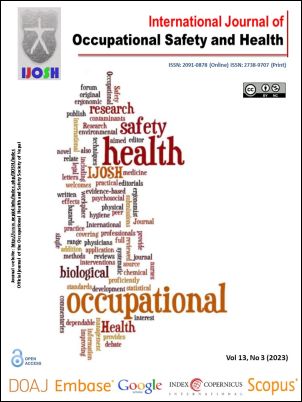Heat Stress Vulnerability Among Small-Scale Factory Workers and Adaptive Strategies in Ahmedabad: a Cross Sectional Study
DOI:
https://doi.org/10.3126/ijosh.v13i3.44241Keywords:
Foundry, Heat Stress, OSHA, Steel rolling mill, Wet Bulb Globe Temperature (WBGT)Abstract
Introduction: Global warming is likely to affect certain groups such as workers in heat-producing industries. With limited research exploring such an important area, this study aimed to explore the heat stress vulnerability and adaptive strategies of indoor small-scale factory workers.
Methods: This was a cross-sectional study and a mixed-method approach was used. The study setting was small-scale factory units. The quantitative component included environmental and biological monitoring from six units of steel rolling mills and foundry in the summer and winter seasons. The study was conducted during the period of November-2018 and May 2019. Heat stress was measured among workers using a portable Wet Bulb Globe Temperature (WBGT) meter. The physiological parameters of workers were also measured. The qualitative component included in-depth interviews of workers and supervisors from eleven units.
Results: The maximum temperatures recorded at steel rolling mills and foundry crossed Occupational Safety and Health Administration (OSHA) threshold (27.5℃) in summer as well as winter. The mean WBGT at the steel rolling mill recorded 31.5℃. The physiological measurements of workers also crossed the threshold level for heart rate and oral temperature in steel rolling and foundry units. The units had mechanisms to dissipate heat but lack a temperature monitoring mechanism inside the units. The workers wore lighter or fewer clothes as an adaptive measure but uncomfortable PPEs in foundry units were avoided.
Conclusion: Heat stress in small-scale industry units was found high and there is a high need to develop specific strategies for such vulnerably high heat-exposed groups.
Downloads
Downloads
Published
How to Cite
Issue
Section
License
Copyright (c) 2023 Hardik Parmar, Nilesh Gawde

This work is licensed under a Creative Commons Attribution-NonCommercial 4.0 International License.
This license enables reusers to distribute, remix, adapt, and build upon the material in any medium or format for noncommercial purposes only, and only so long as attribution is given to the creator.





